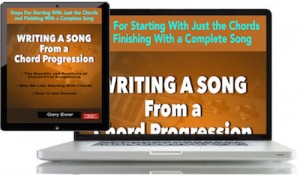Too much analyzing can get you stuck in a creative rut. Here’s how to make it work for you.
If you’re ready to take your songwriting to a new level, you need Gary’s “The Essential Secrets of Songwriting” 10-eBook Deluxe Bundle of manuals. They’ll take you through every aspect of good songwriting, give you hundreds of progressions to try, and cover every aspect of what a good songwriting process should be. GET THE SALE PRICE.
 An important part of improving your songwriting skills is analyzing music. Analyzing, at least in a songwriter’s context, means listening to your music with a critical ear, and applying what you know about great songs to make improvements.
An important part of improving your songwriting skills is analyzing music. Analyzing, at least in a songwriter’s context, means listening to your music with a critical ear, and applying what you know about great songs to make improvements.
It’s something that should be done carefully, however. It’s happened many times that I’ve heard songs that defy the odds, sounding great even though they break away from the common principles of popular songwriting.
I like using an expression when it comes to this sort of thing, which is this:
Analyze other people’s successes, and your own failures.
Sticking to that simple directive means, in the first instance, that you’ll spend your time focusing in on the music you love, and discovering why you love it so much, and then applying what you learn to your own music.
Secondly, it helps you avoid the problem of over-analyzing — and possibly destroying — music you’ve written that might go against common principles. For example, you may have written a chorus melody that sits below your verse melody — not a common thing, but Genesis did it in “No Reply At All” — and you start to worry if you’ve done something wrong.
The indication in songwriting that you’ve done something wrong is that it sounds wrong. And that’s it. If you’ve written music that goes against all conventional norms, but you love it, don’t analyze it. Just enjoy it, move on.
And some day, when you’re far enough removed from having written it, you might go back and figure out why you love it. But for now, the only music you write that you should be spending any amount of time analyzing and applying the principles of music should be songs you’ve written that aren’t working.
By sticking to that simple prescription, songwriting becomes a very positive activity, where songs that aren’t working are an occasion to improve, and songs that are working are an opportunity to celebrate.
___________
Written by Gary Ewer. Follow Gary on Twitter.
 Like starting your songs by working out the chords first? You need Gary’s newest ebook, “Writing a Song From a Chord Progression“, which takes you through the whole process step by step. It’s part of the 10-eBook Deluxe Bundle. GET THE SALE PRICE.
Like starting your songs by working out the chords first? You need Gary’s newest ebook, “Writing a Song From a Chord Progression“, which takes you through the whole process step by step. It’s part of the 10-eBook Deluxe Bundle. GET THE SALE PRICE.











Pingback: How To Be An Expert Active Listener In Music – Fantasy Music
Apart from your daily most valuable advices, Gary, the musical examples you give to illustrate what you mean, are top! Like today’s Genesis’ “No Reply At All”. What an impressive, well-produced song by the way.
Hi! I’m always listening to my own compositions. Everyday, I record my work in progress compositions in my mp3 player, in order to find out how improve what I do. (sorry, I have some difficulty in English, this isn’t my native language)
Sheer Ignorance is the down fall of most wannabe Writers
it aint who you know, it’s what you know and most have not got
the patience ,to learn via study and listening to the best song
writers around them
Re write and then re write again till every phrase works, sleep
on it , dont rush to get slaps on the back from peers who dont
know enough about what makes a great song
work on several songs at the same time, take your time dont
get stuck on one song move on to another
Keep that up and one day you may have something great
but nothing comes unless you learn your trade